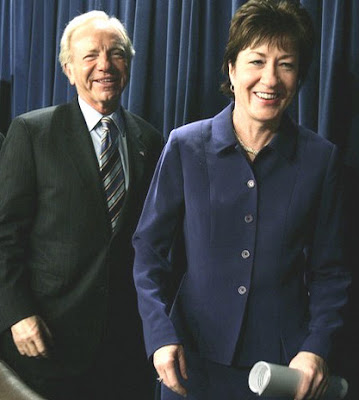(This is the fifth in our series of posts on Justice Samuel Alito. Read the first four posts here, here, here and here.)
Planned Parenthood v. Casey [link]
The background: Planned Parenthood brought suit, challenging the Pennsylvania Abortion Control Act as unconstitutional on its face in light of the Supreme Court's decisions in Roe v. Wade and Webster v. Reproductive Health Services.
The Pennsylvania law required (with limited exceptions) that all pregnant women seeking abortions sign a form affirming that they'd notified their husbands of the decision to abort. And the law specified that, "each form must bear a notice that false statements are punishable by law."
The question: At issue was whether spousal notification created an "undue burden" for women--with "undue burden" defined by the Supreme Court as an "absolute obstacle or severe limitation."
The decision: Two of the panel's three judges voted to strike down the spousal notification provision.
They argued that, since the Supreme Court had ruled that forced parental notification for minors created an unconstitutional limitation on the abortion decision, requiring an adult woman to make a similar notification had to be seen as violating a woman's rights as well.
They noted:
Physical force is not the only means at the disposal of a husband who seeks to prevent an abortion...the record reveals that the forms of effective psychological coercion available to a husband are potentially unlimited.
And:
As the Court recognized in Eisenstadt v. Baird, "the marital couple is not an independent entity with a mind and heart of its own, but an association of two individuals each with a separate intellectual and emotional makeup.
If the right of privacy means anything, it is the right of the individual, married or single, to be free from unwarranted governmental intrusion into matters so fundamentally affecting a person as the decision whether to bear or beget a child."
But Alito had a different view.
In dissent, as in Sheridan v. Dupont and U.S. v. Rybar, he took up a contorted argument, reaching a conclusion that just happened to be in sync with the hard-right conservative ideology he'd enunciated years earlier.
Namely: He argued that since spousal notification would only serve as a roadblock to a small fraction of women, it couldn't possibly fail the the "undue burden" test:
Section 3209 cannot affect more than about 5% of married women seeking abortions or an even smaller percentage of all women desiring abortions...The plaintiffs failed to show even roughly how many of the women in this small group would actually be adversely affected by Section 3209...At best, the record shows that Section 3209 would inhibit abortions " 'to some degree' " or that "some women [would] be less likely to choose to have an abortion by virtue of the presence" of Section 3209.
Of course, by this bizarre logic, a law that created an
insurmountable hardship for women seeking abortions would have to be sustained so long as only a small percentage of women were imperiled.
The majority, seeming not to take this line of reasoning very seriously, dispatched it in three sentences:
As we read Justice O'Connor's explications of the concept of "undue burden," they are all consistent with the view that the right to elect not to carry to term is a constitutional right of each individual woman. Where it is clear that a governmental regulation will restrict the ability of some women to choose an abortion...whether there is an undue burden turns on the degree of restriction that the affected women will experience. Accordingly, whether the adversely affected group is but a small fraction of the universe of pregnant women desiring an abortion seems to us irrelevant to that issue." (Emphasis added.)
When the case made it to the Supreme Court, Alito's framework was tossed aside even more quickly. The majority
wrote:
The proper focus of constitutional inquiry is the group for whom the law is a restriction, not the group for whom the law is irrelevant.
As in
Sheridan and
Rybar, the Supreme Court rejected Alito's dissent, vindicating the unanimous judgment of his colleagues.
The reaction: NARAL put out a report, based in no small part on this case, proclaiming that, "The nomination of Alito tests whether Roe will be a mantelpiece memory, or a meaningful part of our Constitution."
Kate Michelman, one-time NARAL head charged that Alito was "treating women like children who need permission from their parents," and that the case was, "an extraordinary window into how he views the law."
Meanwhile, the conservative magazine Human Events dismissed criticism of Alito's role in the case, opining that spousal notification, "is a particularly mild and popular restriction on abortion."
Operation Rescue President Troy Newman gushed: "We believe that this nomination may fulfill Bush's promise to appoint justices in the mold of Scalia and Thomas...We are now on the fast track to derailing Roe v. Wade as the law of the land."









